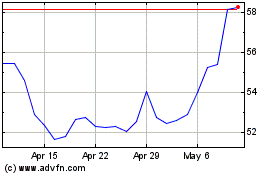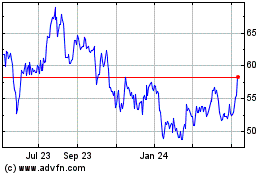Legal challenge looms in the race to control key component used
in electric-car batteries
By Scott Patterson
This article is being republished as part of our daily
reproduction of WSJ.com articles that also appeared in the U.S.
print edition of The Wall Street Journal (October 22, 2018).
A Chilean court is expected to rule in the coming week on a
lawsuit aimed at derailing a deal critics say could create a cartel
for lithium, a key component in batteries used in electric vehicles
and smartphones.
The legal challenge is the latest twist in a nearly yearlong
effort by China's Tianqi Lithium Corp. to acquire a large stake in
Chile's biggest lithium producer, Sociedad Quimica y Minera de
Chile SA, or SQM.
The battle has opened another front in a global scramble to
control the ingredients that make up lithium-ion batteries, the
power packs for much of the world's gadgets and electric cars.
Tianqi agreed in May to buy a 24% stake in SQM from Canadian
mining giant Nutrien Ltd. for $4.1 billion. The sale, following
months of negotiations, was required by regulators in China and
India as a condition for approving the merger of two big Canadian
miners that created Nutrien.
SQM is the world's second-biggest lithium miner by production.
Tianqi also operates a big lithium mine in Australia with chemicals
giant Albemarle Corp., the world's No. 1 producer of lithium based
in Charlotte, N.C.
The SQM deal has won regulatory approval in Chile and other
jurisdictions. Chile's competition regulator gave the agreement a
green light after imposing restrictions on Tianqi, such as
forbidding Tianqi-nominated directors to share SQM's commercially
sensitive information.
Earlier this month, a group of companies controlled by SQM's
biggest shareholder, the Chilean tycoon Julio Ponce Lerou who also
is the son-in-law of the late Chilean dictator Augusto Pinochet,
challenged the deal's approval process in the country's
Constitutional Court.
Mr. Lerou has argued a Tianqi-SQM combination could result in
the leaking of SQM trade secrets to Tianqi partner and SQM rival
Albemarle. Outside critics say the deal also could create an
OPEC-like lithium cartel that might be able to influence pricing
and access to the metal at a time when demand is soaring.
"The biggest concern I have is about those few companies having
monopolistic tendencies," said Jon Hykawy, president of Stormcrow
Capital Ltd., a Toronto research firm that focuses on battery
minerals. There is a risk that "these guys are going to charge what
they want to charge," he said.
A court hearing is set for Monday, Oct 22, with a decision
expected shortly after. If the court throws out the suit, it would
pave the way for the sale of the SQM stake to close in the fourth
quarter. If the court agrees to review the suit, the deal would be
delayed for an indefinite period.
Tianqi and Nutrien say the deal won't be anticompetitive, citing
limitations imposed by Chile's competition regulator, such as
restricting Tianqi from placing its own employees on SQM's
board.
"We look forward to vigorously defending our position before the
Constitutional Court," a Tianqi spokesman said. Albemarle declined
to comment.
SQM itself opposes the sale of the stake. In a statement, it
said the agreement with Chile's competition regulator doesn't
"effectively resolve the risks that it intends to mitigate."
Nutrien expects the court to strike down the lawsuit, company
spokesman Richard Downey said. He said Mr. Ponce is "attempting to
manipulate the legal system" in Chile.
A lawyer for Mr. Ponce didn't respond to requests for
comment.
Lithium, once best known as a treatment for depression, was long
a niche metal. The industry built around mining it out of the
ground was small and low profile.
Demand skyrocketed with the rise of the lithium-ion batteries,
raising scrutiny over who controls the world's supplies. Chile
boasts nearly half of the world's known lithium reserves, according
to the U.S. Geological Survey, and has the lowest cost of
production.
The deal at the center of the suit -- and the separate joint
venture between Tianqi and Albemarle -- draws together three
companies that control about two-thirds of the world's lithium
production, based on 2017 output, according to Benchmark Mineral
Intelligence.
With demand soaring, lithium has joined other once-obscure
metals, like cobalt, as an object of a global scramble. China has
moved ahead in the world-wide race to control cobalt, locking up
access to much of the metal in Congo.
In a similar way, companies are racing to lock up supplies of
lithium. Japan's SoftBank Group this year paid nearly $80 million
for a roughly 10% stake in Canada's Nemaska Lithium Inc. The
trading arm of Toyota Group, parent of Toyota Motor Corp., said it
was taking a 15% stake in Australian lithium producer Orocobre Ltd.
for about $225 million. Tesla Inc. has signed a three-year supply
agreement to secure lithium from an Australian operation partly
owned by SQM.
The biggest deal by far -- and the most disputed -- is Tianqi's
proposed investment in SQM.
The Chilean development agency overseeing the Salar de Atacama
region where most of the country's lithium is produced filed an
objection to the deal with the country's competition regulator
earlier this year. It argued the deal would "gravely distort market
competition." Despite those concerns, Chile's competition regulator
approved the deal.
Write to Scott Patterson at scott.patterson@wsj.com
(END) Dow Jones Newswires
October 22, 2018 02:47 ET (06:47 GMT)
Copyright (c) 2018 Dow Jones & Company, Inc.
Nutrien (NYSE:NTR)
Historical Stock Chart
From Jun 2024 to Jul 2024

Nutrien (NYSE:NTR)
Historical Stock Chart
From Jul 2023 to Jul 2024
